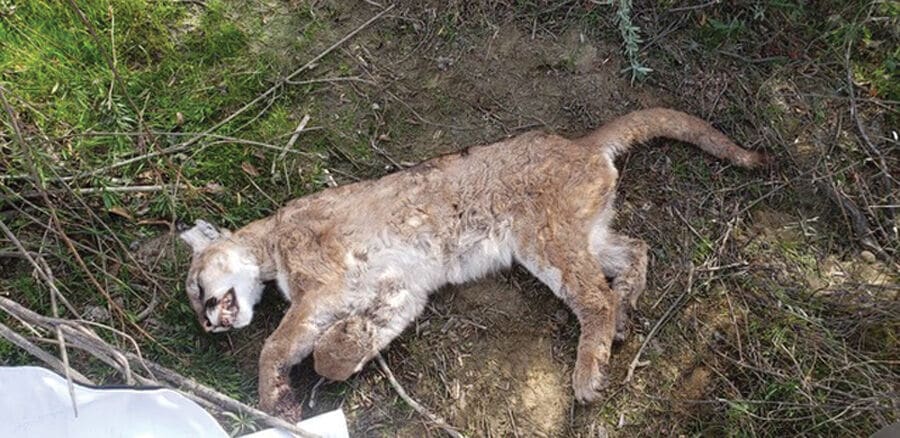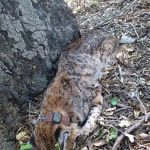National Park Service research biologists announced last week that an adult female bobcat (B-372) and a sub-adult male mountain lion (P-76) were both killed by the effects of anticoagulant rat poisons (or anticoagulant rodenticides, also known as ARs). Both species have been part of a local “urban carnivore” tracking study by the National Park Service which has been ongoing for 24 years on bobcats and 23 years on mountain lions.
The news came on the eve of an announcement from the state legislature: AB 1788, the California Ecosystems Protection Act of 2020, just passed the legislature on Monday night, Aug. 31, and will be going to the governor’s desk for final approval. The bill will prohibit the use of second generation anticoagulant rodenticides as defined by the state. The bill was introduced by Assembly Member Richard Bloom (who represents Malibu) and co-authored by State Senator Henry Stern (who also represents Malibu).
“The ecosystem services provided by native wildlife predators are a public trust, just like clean air and water. We, as California residents, are obligated to conserve these wildlife populations for future generations of Californians,” part of the text of the bill states. “Scientific research and state studies have found rodenticides in over 75 percent of animals tested. These rodenticides lead to direct mortality and chronic long-term health impacts for natural predators, nontarget organisms, and endangered species and further steps are needed to reduce rodenticide exposure in nontarget animals.”
Those statistics prove true locally, according to Santa Monica Mountains biologists.
“Virtually every mountain lion we test has rat poison in its system, and so do 90 percent of the bobcats,” Seth Riley, PhD, of the National Park Service said in an interview on Feb. 28, 2019.
A necropsy report on the bobcat documented brodifacoum, bromadiolone and diphacinone. These compounds include first- and second-generation poisons. Her body was discovered on June 20 under an oak tree in a residential neighborhood of Agoura Hills. She had been captured six months earlier, on Jan. 28, at the south end of Cheeseboro Canyon north of the Ventura (101) Freeway, and was in good health at that time.
P-76 is the sixth collared mountain lion in the local study to die of coagulopathy (uncontrolled internal or external bleeding), and the third in the last two years. He was first captured and collared by the state Department of Fish & Wildlife in November 2019 in Northridge.
The local NPS study is not the only one finding high levels of rat poison in wildlife. The state released its own findings in December 2018 that documented super-toxic rat poisons in more than 85 percent of tested mountain lions, bobcats and protected Pacific fishers, prompting state regulators to open a new evaluation of whether to further restrict or ban the powerful toxins.
Four years ago, the state limited the sale and use of the so-called super-toxic rat poisons (known as second-generation anti-coagulant rodenticides) except to licensed applicators, agricultural users and licensed pest-control operators, but it didn’t appear to have any effect. The poisons continued to be used liberally by shopping centers, homeowners associations and restaurants, and continued to get into the wildlife food chain. AB 1788 hopes to put an end to the proliferation of such chemicals.
The City of Malibu has also been trying to do its part to resolve the poison issue. On Dec. 9, 2019, city council adopted a Local Coastal Program (LCP) amendment banning the use of pesticides (insecticides, rodenticides or any toxic substance with the potential to significantly degrade biological resources) in the city.
The amendment was submitted to the California Coastal Commission (CCC) for certification and on June 19, 2020, the commission deemed the amendment complete, but proposed modifications to the city’s language. On Sept. 10, instead of holding a hearing, CCC staff will recommend a one-year extension to allow the city time to tweak its language.
According to last week’s Malibu City manager update, “CCC staff believes this matter will be brought to hearing prior to one year; however, CCC staff would like additional time to work with Malibu staff … Until the amendment is certified, a condition of approval regarding the prohibition will be added to coastal development permits.”
The nonprofit Poison Free Malibu sent the press release announcing these latest wildlife poisonings to the Coastal Commission staff as well as the commissioners to let them know about the urgent need to ban these rodenticides as soon as possible in order to avoid more tragic deaths.
“We hear that asking for a year is standard even if less time is needed,” Poison Free Malibu co-founder Kian Schulman wrote to The Malibu Times. “The staff believes this matter will be brought to hearing in the near term, but told us they asked for the extension because they couldn’t make the official 90-day Oct. 26 deadline.”


